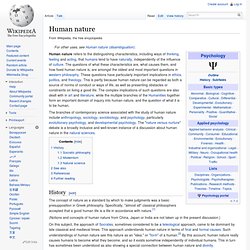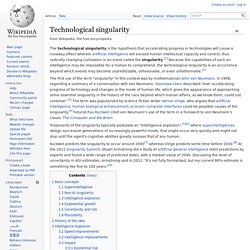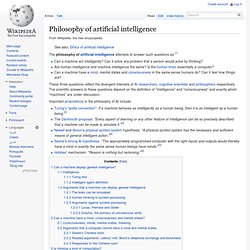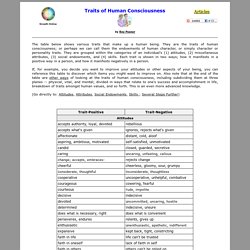

Human nature. The branches of contemporary science associated with the study of human nature include anthropology, sociology, sociobiology, and psychology, particularly evolutionary psychology, and developmental psychology.

The "nature versus nurture" debate is a broadly inclusive and well-known instance of a discussion about human nature in the natural sciences. History[edit] The concept of nature as a standard by which to make judgments was a basic presupposition in Greek philosophy. Specifically, "almost all" classical philosophers accepted that a good human life is a life in accordance with nature.[1] (Notions and concepts of human nature from China, Japan or India are not taken up in the present discussion.) Developing Robots with Human Traits. NASA Developing Robots with Human Traits Will robots that help astronauts in space be as friendly and likeable as fictional "Star Wars" droid "R2-D2"?

NASA researchers envision futuristic robots that 'act' like people to enable these mechanical helpers to work more efficiently with astronauts. "Our goal is not for robots to have the same 'thought process' as humans, but rather for them to act, respond and interact more 'naturally' in ways that humans do with other humans," said Illah Nourbakhsh, a scientist who leads a group developing human-robot teams at NASA Ames Research Center, located in California's Silicon Valley.
Technological singularity. The technological singularity is the hypothesis that accelerating progress in technologies will cause a runaway effect wherein artificial intelligence will exceed human intellectual capacity and control, thus radically changing civilization in an event called the singularity.[1] Because the capabilities of such an intelligence may be impossible for a human to comprehend, the technological singularity is an occurrence beyond which events may become unpredictable, unfavorable, or even unfathomable.[2] The first use of the term "singularity" in this context was by mathematician John von Neumann.

Proponents of the singularity typically postulate an "intelligence explosion",[5][6] where superintelligences design successive generations of increasingly powerful minds, that might occur very quickly and might not stop until the agent's cognitive abilities greatly surpass that of any human. Basic concepts Superintelligence Non-AI singularity Intelligence explosion Exponential growth Plausibility. Philosophy of artificial intelligence. The philosophy of artificial intelligence attempts to answer such questions as:[1] Can a machine act intelligently?

Can it solve any problem that a person would solve by thinking? Are human intelligence and machine intelligence the same? Is the human brain essentially a computer? Can a machine have a mind, mental states and consciousness in the same sense humans do? These three questions reflect the divergent interests of AI researchers, cognitive scientists and philosophers respectively. Important propositions in the philosophy of AI include: What Makes Us Uniquely Human? For as long as human animals have pondered how we might differ from nonhuman animals (hereafter animals for convenience) many ideas have come and gone. For example, it's been postulated that humans are created in the image of God and are the only rational beings. People vary in their opinions on whether we are the only animals who are created in the image of God and of course it's not a claim that can be proven or disproven.
However, ample research has shown that animals are rational beings and that they also share with us many other traits that were once thought to be uniquely human, including manufacturing and using tools, having culture, having a sense of self, using complex systems of communication, producing art, and having rich and deep emotional lives and knowing right from wrong. Two traits that seem to separate us from other animals are we're the only animals who cook food and no other animals are as destructive and evil . Science & Environment - Do animals have imagination? Decades of intensive studies have revealed that chimpanzees and other species can pretend.

But they might not be able to fully tell reality from fantasy. An eight-year-old juvenile chimpanzee named Kakama trudged along a path among the forest trees, following his pregnant mother. A scientist sat silently at a distance, watching Kakama pick up a log and carry it with him for hours. At one point, Kakama made a nest and placed the log in it, as if it were a small chimpanzee. Months later, two field assistants observed the same thing: Kakama was playing with a similar log, which they labelled "Kakama's toy baby. " Was Kakama simply confused? Kanzi, the famous bonobo, liked to pretend as well. From an early age, human children act out imagined scenes that conflict with reality. Dreams could be thought of as being one form of imagination. But pretending or "make believe" requires a bit more mental complexity than that. Flights of fantasy Mind games. Personality Traits, Character traits, Human Traits, personal characteristics, human qualities, Traits of Human Consciousness, human makeup, personal attitudes, negative attitudes, positive attitudes, list, makeup of the individual human, endowments, consc.
Several Steps Further: Aside from the listing above, traits of human consciousness can be viewed from a number of other perspectives.

Here are several: Traits Organized from Psychological (Inner-oriented) to Social (Outer-oriented) Human personality/character traits can be divided by those that are inner/psychological; and those that are outer-oriented/social. Www.bis.gov.uk/assets/foresight/docs/identity/13-523-future-identities-changing-identities-report.pdf.